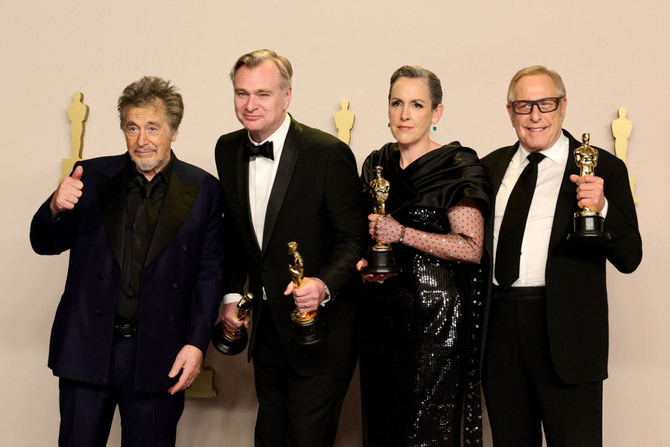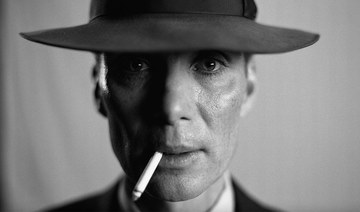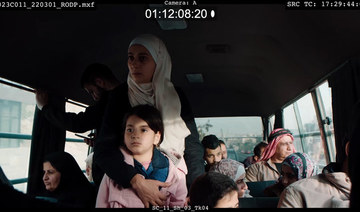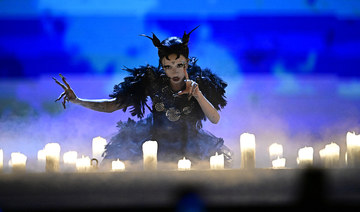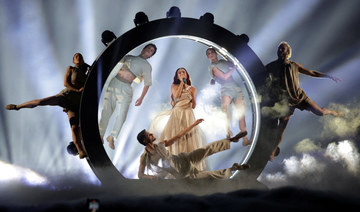LOS ANGELES: “Oppenheimer,” a solemn three-hour biopic that became an unlikely billion-dollar box-office sensation, was crowned best picture at a 96th Academy Awards that doubled as a coronation for Christopher Nolan.
After passing over arguably Hollywood’s foremost big-screen auteur for years, the Oscars made up for lost time by heaping seven awards on Nolan’s blockbuster biopic, including best actor for Cillian Murphy, best supporting actor for Robert Downey Jr. and best director for Nolan.
In anointing “Oppenheimer,” the Academy of Motion Pictures Arts and Sciences did something it hasn’t done for more than a decade: hand its top prize to a widely seen, big-budget studio film. In a film industry where a cape, dinosaur or Tom Cruise has often been a requirement for such box office, “Oppenheimer” brought droves of moviegoers to theaters with a complex, fission-filled drama about J. Robert Oppenheimer and the creation of the atomic bomb.
“For better or worse, we’re all living in Robert Oppenheimer’s world,” said Murphy in his acceptance speech. “I’d like to dedicate this to the peacemakers.”
As a film heavy with unease for human capacity for mass destruction, “Oppenheimer” also emerged – even over its partner in cultural phenomenon, “Barbie” – as a fittingly foreboding film for times rife with cataclysm, man-made or not. Sunday’s Oscars at the Dolby Theatre in Los Angeles unfolded against the backdrop of wars in Gaza and Ukraine, and with a potentially momentous US election on the horizon.
The most closely watched contest of the Academy Awards went to Emma Stone, who won best actress for her performance as Bella Baxter in “Poor Things.”
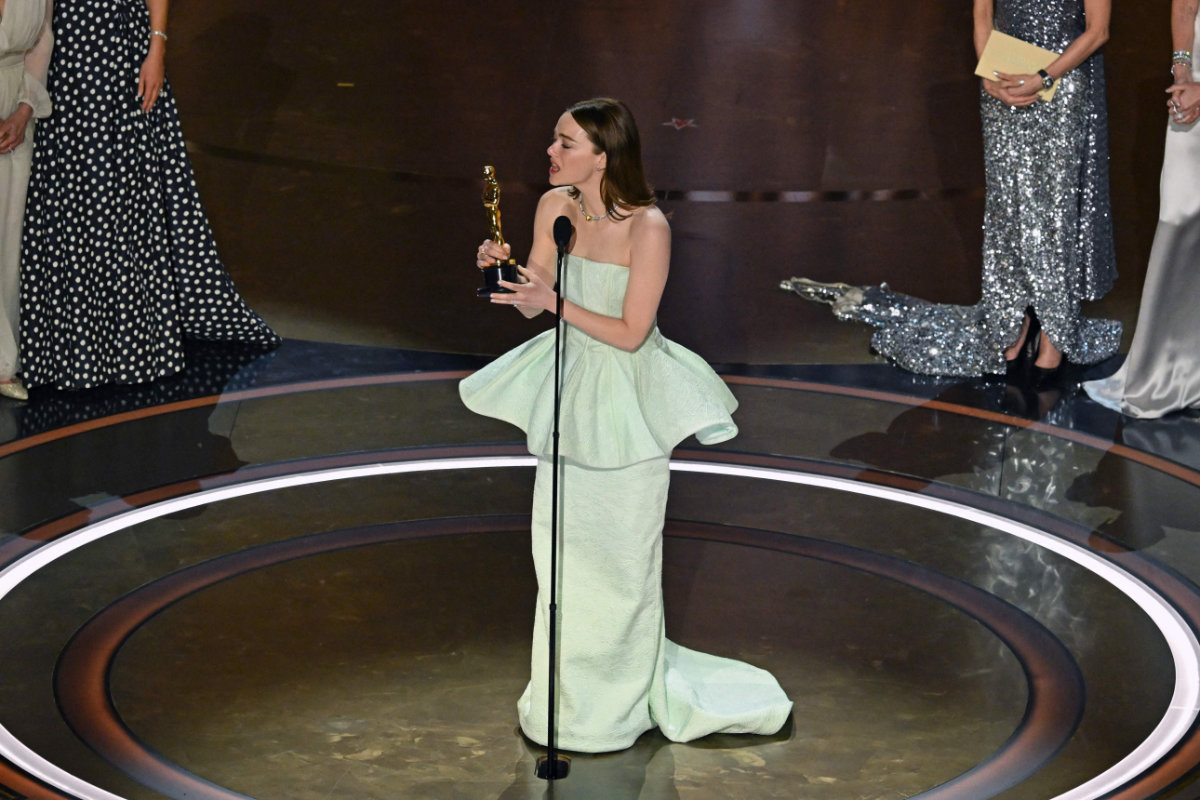
US actress Emma Stone accepts the award for Best Actress in a Leading Role for "Poor Things" onstage during the 96th Annual Academy Awards at the Dolby Theatre in Hollywood, California on March 10, 2024. (AFP)
In what was seen as the night’s most nail-biting category, Stone won over Lily Gladstone of “Killers of the Flower Moon.” Gladstone would have become the first Native American to win an Academy Award.
Instead, Oscar voters couldn’t resist the full-bodied extremes of Stone’s “Poor Things” performance. The win for Stone, her second best actress Oscar following her 2017 win for “La La Land,” confirmed the 35-year-old as arguably the preeminent big-screen actress of her generation. The list of women to win best actress two or more times is illustrious, including Katharine Hepburn, Frances McDormand, Ingrid Bergman and Bette Davis.
“Oh, boy, this is really overwhelming,” said Stone, who fought back tears and a broken dress during her speech.
Sunday’s broadcast had razzle dazzle, including a sprawling song-and-dance rendition of the “Barbie” hit “I’m Just Ken” by Ryan Gosling, with an assist on guitar by Slash and a sea of Kens who swarmed the stage.
But protest and politics intruded on an election-year Academy Awards, where demonstrations for Gaza raged outside the Dolby Theatre in Los Angeles. Late during the show, Kimmel read a critical social media post from former president Donald Trump.
“Thank you for watching,” said host Jimmy Kimmel. “Isn’t it passed your jail time?”
Nolan has had many movies in the Oscar mix before, including “Inception,” “Dunkirk” and “The Dark Knight.” But his win Sunday for direction is the first Academy Award for the 53-year-old filmmaker. Addressing the crowd, Nolan noted cinema is just over a hundred years old.
“We don’t know where this incredible journey is going from here,” said Nolan. “But to think that I’m a meaningful part of it means the world to me.”
Downey, nominated twice before (for “Chaplin” and “Tropic Thunder”), also notched his first Oscar, crowning the illustrious second act of his up-and-down career.
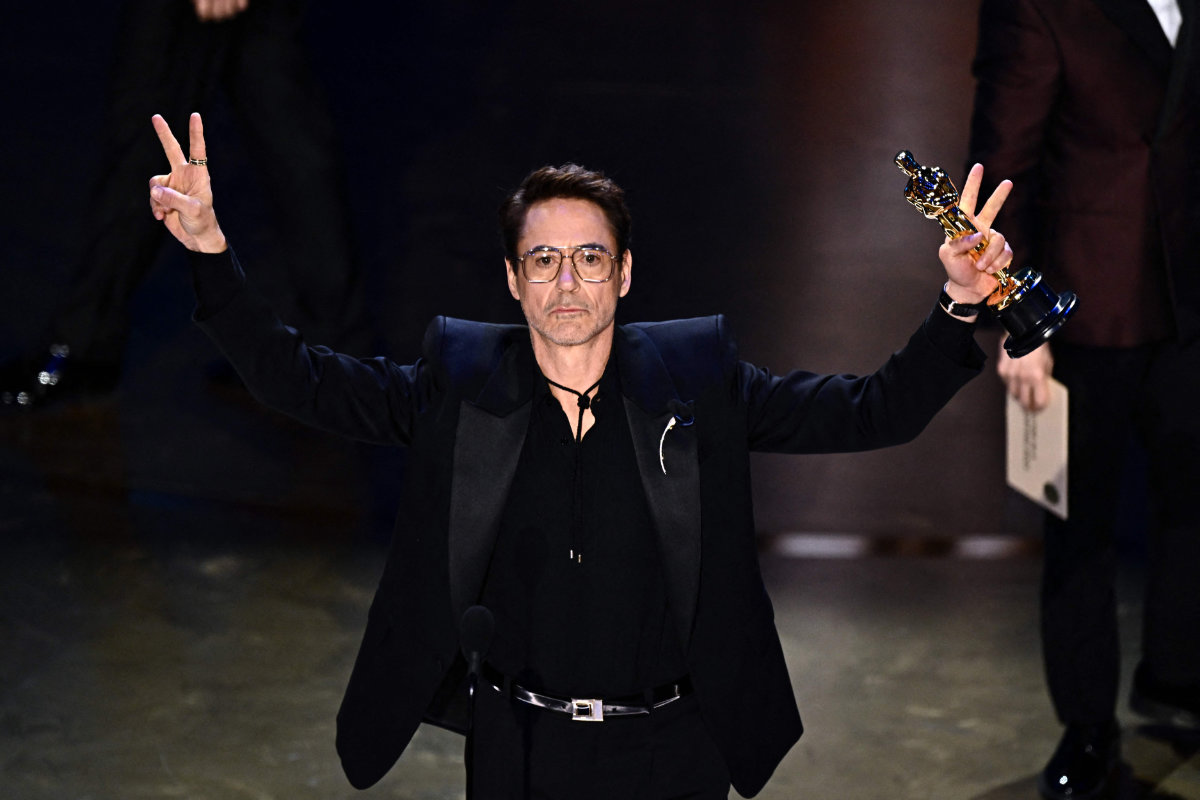
US actor Robert Downey Jr. accepts the award for Best Actor in a Supporting Role for "Oppenheimer" onstage during the 96th Annual Academy Awards in Hollywood, California on March 10, 2024. (AFP)
“I’d like to thank my terrible childhood and the academy, in that order,” said Downey, the son of filmmaker Robert Downey Sr.
“Barbie,” last year’s biggest box-office hit with more than $1.4 billion in ticket sales, ultimately won just one award: best song (sorry, Ken) for Billie Eilish and Finneas’ “What Was I Made For?” It’s their second Oscar, two years after winning for their James Bond theme, “No Time to Die.”
But after an awards season that stayed largely inside a Hollywood bubble, geopolitics played a prominent role. Protests over Israel’s war in Gaza snarled traffic around the Dolby Theatre in Los Angeles, slowing stars’ arrival on the red carpet and turning the Oscar spotlight toward the ongoing conflict. Some protesters shouted “Shame!” at those trying to reach the awards.
Jonathan Glazer, the British filmmaker whose chilling Auschwitz drama “The Zone of Interest” won best international film, drew connections between the dehumanization depicted in his film and today.
“Right now, we stand here as men who refute their Jewishness and the Holocaust being hijacked by an occupation which has led to conflict for so many innocent people, whether the victims of October the 7th in Israel, or the the ongoing attack on Gaza, all the victims, this dehumanization, how do we resist?”
The war in Gaza was on the minds of many attendees, as was the war in Ukraine. A year after “Navalny” won the same award, Mstyslav Chernov’s “20 Days in Mariupol,” a harrowing chronicle of the early days of Russia’s invasion of Ukraine, won best documentary. The win, a first for The Associated Press and PBS’ “Frontline,” came as the war in Ukraine passed the two-year mark with no signs of abating.

Raney Aronson-Rath, from left, Mstyslav Chernov, and Michelle Mizner pose in the press room with the award for best documentary feature film for "20 Days in Mariupol" at the Oscars on Sunday, March 10, 2024, at the Dolby Theatre in Los Angeles. (Invision/AP)
Mstyslav Chernov, the Ukrainian filmmaker and AP journalist whose hometown was bombed the day he learned of his Oscar nomination, spoke forcefully about Russia’s invasion.
“This is the first Oscar in Ukrainian history,” said Chernov. “And I’m honored. Probably I will be the first director on this stage to say I wish I’d never made this film. I wish to be able to exchange this (for) Russia never attacking Ukraine.”
In the early going, Yorgos Lanthimos’ Frankenstein-riff “Poor Things” ran away with three prizes for its sumptuous craft, including awards for production design, makeup and hairstyling and costume design.
Kimmel, hosting the ABC telecast for the fourth time, opened the awards with an monologue that emphasized Hollywood as “a union town” following 2023’s actor and writer strikes, drew a standing ovation for bringing out teamsters and behind-the-scenes workers — who are now entering their own labor negotiations.
The night’s first award was one of its most predictable: Da’Vine Joy Randolph for best supporting actress, for her performance in Alexander Payne’s “The Holdovers.” An emotional Randolph was accompanied to the stage by her “Holdovers” co-star Paul Giamatti.
“For so long I’ve always wanted to be different,” said Randolph. “And now I realize I just need to be myself.”
Though Randolph’s win was widely expected, an upset quickly followed. Hayao Miyazaki’s “The Boy and the Heron” won for best animated feature, a surprise over the slightly favored “Spider-Man: Across the Spider-Verse.” Miyazaki, the 83-year-old Japanese anime master who came out of retirement to make “The Boy and the Heron,” didn’t attend the ceremony. He also didn’t attend the 2003 Oscars when his “Spirited Away” won the same award.
Best original screenplay went to “Anatomy of a Fall,” which, like “Barbie,” was penned by a couple: director Justine Triet and Arthur Harari. “This will help me through my midlife crisis, I think,” said Triet.
In adapted screenplay, where “Barbie” was nominated — and where some suspected Greta Gerwig would win after being overlooked for director — the Oscar went to Cord Jefferson, who wrote and directed his feature film debut “American Fiction.” He pleaded for executives to take risks on young filmmakers like himself.
“Instead of making a $200 million movie, try making 20 $10 million movies,” said Jefferson, previously an award-winning TV writer.
The Oscars belonged largely to theatrical-first films. Though it came into the awards with 19 nominations, Netflix was a bit player. Its lone win came for live action short: Wes Anderson’s “The Wonderful Story of Henry Sugar,” based on the story by Roald Dahl.
Historically, having big movies in the mix for the Oscars’ top awards has been good for broadcast ratings. The Academy Awards’ largest audience ever came when James Cameron’s “Titanic” swept the 1998 Oscars.
Winners in key categories for the 96th Academy Awards
HOLLYWOOD: Christopher Nolan's "Oppenheimer" was the big winner of the night with seven awards, while "Poor Things" — a female take on the Frankenstein story — won four.
- Best picture: "Oppenheimer"
- Best director: Christopher Nolan, "Oppenheimer"
- Best actor: Cillian Murphy, "Oppenheimer"
- Best actress: Emma Stone, "Poor Things"
- Best supporting actor: Robert Downey Jr, "Oppenheimer"
- Best supporting actress: Da'Vine Joy Randolph, "The Holdovers"
- Best original screenplay: Justine Triet and Arthur Harari, "Anatomy of a Fall"
- Best adapted screenplay: Cord Jefferson, "American Fiction"
- Best international feature film: "The Zone of Interest" (United Kingdom)
- Best animated feature: "The Boy and the Heron"
- Best documentary feature: "20 Days in Mariupol"
- Best original score: Ludwig Goransson, "Oppenheimer"
- Best original song: Billie Eilish and Finneas O'Connell, "What Was I Made For?" from the "Barbie" soundtrack
- Best cinematography: Hoyte van Hoytema, "Oppenheimer"
- Best film editing: Jennifer Lame, "Oppenheimer"
- Best makeup and hairstyling: "Poor Things"
- Best costume design: "Poor Things"
- Best production design: "Poor Things"
- Best sound: "The Zone of Interest"
- Best visual effects: "Godzilla Minus One"
(AFP)





